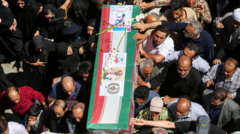The article discusses the effects of the 12-day military conflict between Israel and Iran, highlighting the dire economic situation and internal pressures on the Iranian regime while raising questions about the potential for change amidst deep-seated grievances.
# Iran Teeters on the Brink Following Conflict with Israel and U.S.

# Iran Teeters on the Brink Following Conflict with Israel and U.S.
The aftermath of the recent Iran-Israel conflict leaves the Islamic Republic grappling with a shaky future.
In the heart of Tehran, the memories of war resound through the streets as citizens attempt to reconcile aspirations for freedom with the stark realities of ongoing political repression. Roxana Saberi, a dual citizen and journalist previously imprisoned in Iran, reflected on the tumultuous aftermath of the recent conflict in a poignant commentary that resonates with her past experiences. The recent hostilities, characterized by Israeli airstrikes— including an attack on the notorious Evin prison—have revived the painful memories of her own imprisonment, filled with solitary confinement and fabricated espionage charges.
The civilian toll of warfare weighs heavily on the Iranian populace, as citizens balanced their desires for systemic reform against the grim circumstances surrounding their friends and family. Saberi articulated a longing for liberation, coupled with acute concerns for her loved ones, amidst a deadly conflict. “For a moment, I imagined seeing Iran again in my lifetime,” expressed Saberi, wrestling with dual emotions of hope and despair.
President Masoud Pezeshkian's remarks hinted at the potential for reform, labeling this period as "a golden opportunity for change." Yet, this inflection point also harbors existential risks for the Islamic Republic, which survives amid severe economic challenges. Despite international scrutiny and internal dissent, the regime continues to endure, bolstered by its nuclear ambitions that have become a symbol of nationalism.
Though the conflict between Israel and Iran posed an opportunity to challenge the clerical leadership, it ultimately fell short of causing substantial regime change, especially with the life of 86-year-old supreme leader, Ayatollah Ali Khamenei, untouched during the coup attempt. The unresolved tensions leave an uncertain path ahead for the Islamic Republic and its citizens, who yearn for freedom while occupying a precarious reality. As international watchers observe the unfolding dynamics, the question remains: what will the Islamic Republic choose as it navigates this critical juncture in its history?




















